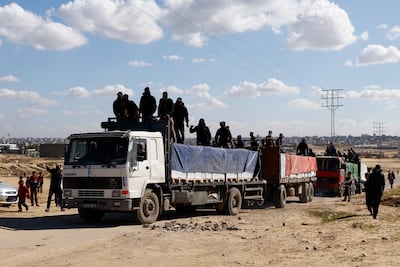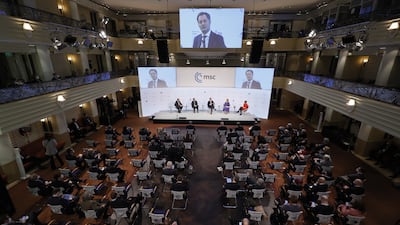Live updates: Follow the latest news on Israel-Gaza
Arab leaders and diplomats will head to Europe this week in a key window for Middle East peace discussions as the war in Gaza overshadows a security summit in Germany.
The King of Jordan, President of Yemen, prime ministers of Lebanon, Iraq and Qatar and foreign ministers of Saudi Arabia and Oman will attend the annual Munich Security Conference, organisers said on Monday.
Israel’s President Isaac Herzog is also expected at the three-day meeting, which begins on Thursday, as diplomats try to broker a pause in fighting in Gaza and stop it spreading across the Middle East.
It is hoped diplomats will use the opportunity of being in the same room in Munich as a platform for talks on the Gaza crisis, as new evidence shows it is fuelling worries in Europe about Islamist extremism.
Polling for the Munich summit shows radical Islamic terrorism is now the top public concern in France and the second-highest in Germany, leaping above the threat from Russia.
Terrorism fears have also mounted in Italy and the UK, the polling shows. Mass migration as a result of war or climate change is now ranked as Germany’s top concern.
Hamas’s October 7 attack on Israel “appears to have prompted a spike in concern about radical Islamic terrorism” in several countries, authors of the annual Munich Security Report said.
Aid push
Western diplomats are also pushing Israel to contain the war’s humanitarian fallout and allow more aid into Gaza, with a possible assault looming on Rafah, the last refuge for many Palestinians.
“We’ve seen goods that were refused now allowed in but compared to the list of goods that still aren’t allowed in, there’s an awful lot on that list,” a western source said.
“We’ve seen the opening of Kerem Shalom [border crossing], which has increased capacity, but are we up anywhere near the levels we need to be at? No.”

Key European leaders in Munich will include German Chancellor Olaf Scholz and EU Commission President Ursula von der Leyen, while Vice President Kamala Harris is travelling from the US.
Mediators from the US, Egypt and Qatar have been trying to broker a truce in exchange for a hostage release by Hamas but Israel has rejected demands for a ceasefire. Efforts are continuing to try to calm the situation before the start of Ramadan, likely to be around March 10.
Foreign ministers from the G7 countries are expected to hold talks on the margins in Munich, where the security report warns that global co-operation is breaking down.
“Many autocrats from Russia to Iran feel there is an opportunity to increase their own size of the cake,” said report author Tobias Bunde.
The hope for Christoph Heusgen, the summit chairman, is to live up to its motto of “peace through dialogue” as it marks its 60th anniversary, although no formal decisions will be taken in Munich.
In a peace symbol, a string quartet featuring an Israeli, a Palestinian and an Egyptian will open the conference. One musician is the son of Daniel Barenboim, believed to be the world’s first Israeli-Palestinian dual citizen.

“This year we have as many crises, conflicts and challenges as we have rarely, if ever, had in the last 60 years,” said Mr Heusgen, an architect of German foreign policy under former chancellor Angela Merkel.
The aim is to “bring together the most important actors and give them an opportunity to share their views, but also to talk, including out of the public eye, and see how we can somehow make headway on the various conflicts,” he said.
“We very much hope that succeeds again this year.”
Also hanging over the summit is the war in Ukraine and the prospect that Donald Trump, who has openly called the foundations of Nato into question, could once again be leading the West’s response. Russia is not invited.
Mr Heusgen played down alarm over Mr Trump’s latest suggestion that he would not stop Russia attacking Nato allies, saying the former president was stressing “in his own way” a well-known demand for Europe to pay more.


